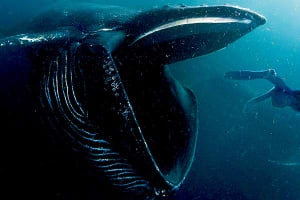In the Whale: The Greatest Fish Story Ever Told
Saturday, Nov 18, 2023 2:00p -
3:30p
Where:
Geological Lecture Hall
24 Oxford Street
Cambridge, MA 02138
Admission:
FREE
Categories:
Animals, Movies, Nature, Rainy Day Ideas
Event website:
https://websites.harvard.edu/hmsc/calendar_event/in-the-whale-the-greatest-fish-story-ever-told/
In the Whale is a feature-length film about, arguably, the greatest true fish story ever told. It’s the account of a man who survived to tell the tale of being swallowed and then spit out by a whale.
In the shark-filled waters off Cape Cod, Massachusetts, Michael Packard has long tempted fate. For several months a year, Packard and his longtime mate, Josiah Mayo, cast off nearly every morning around dawn and navigated through the half-light to their diving grounds off Provincetown, a small community—where they grew up—at the tip of the Cape. Packard buckles on his scuba tank and plunges into the cold waters to hunt on the seafloor.
As the region’s last-remaining commercial lobster diver, the aging father has had his share of harrowing experiences which include close encounters with great whites, near drownings, and having to pull up the body of a fellow diver. He even survived a plane crash in the jungles of Costa Rica where he ran a charter fishing business. But what happened to him on a routine dive during a clear June morning was something he never imagined possible and which many around the world refused to believe.
In an experience of biblical proportions, Packard was engulfed by a humpback whale and caught in the watery cavity of its massive mouth. After some 30 seconds of pitch-black captivity, in which he expected to die, he was spit out, fins first, to the surface, where Mayo and another fisherman rescued him.
The publicity was similarly dizzying for the reclusive fisherman whose survival story spread around the world in news dispatches. But what came after the limelight dimmed was even more significant for Packard.
A Q&A with filmmaker David Abel will follow the screening.
Free event parking at the 52 Oxford Street Garage. Presented by the Harvard Museum of Natural History and the Harvard Museums of Science & Culture.
Image courtesy of David Abel


